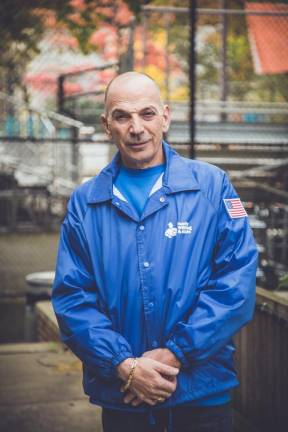Craig Trotta: ‘If They Can Do It, Maybe I Can Do It, Too’
Craig Trotta encourages transformation after incarceration and homelessness — just as Doe Fund mentors did for him

One of Craig Trotta’s earliest memories at The Doe Fund is of the “Men in Blue,” as the group’s monochromatically-uniformed employees are affectionately called, returning from a day on the job with Chinese takeout in hand — and with smiles on their faces. “If they can do it, maybe I can do it, too,” recalled Trotta, who started at the nonprofit in 1997 and now serves as a senior director overseeing the organization’s community improvement projects.
Getting to that day had been precarious; Trotta, like others who find work with the group, had struggled through addiction, homelessness and incarceration. At The Doe Fund, working as a street sweeper and a driver, and eventually moving his way further up the ranks, Trotta seized the opportunity to reinvent himself and pursue a different path through life. Now, he has no intention of turning back — and he’s become a mentor figure not unlike those who guided him when he first started out.
The Doe Fund owes its name to a homeless woman, declared a Jane Doe, who died in the city amid extreme cold weather some 30 years ago. Ever since, its programs have offered work and housing support to aid men in need, which benefits local communities, too; The group’s street cleaning program, run by Trotta, spans over 115 miles of the city’s streets.
Trotta first heard about the organization while he was still in the throes of trouble himself. Hoping to score money for drugs at a Narcotics Anonymous meeting, he instead bumped into his former case manager, who handed him a Doe Fund business card. “For a lot of years, during my addiction and incarceration days, nobody trusted me,” Trotta said.
That changed when he started working at The Doe Fund. The structure, Trotta explained, is meant to help men whose histories resemble Trotta’s bulk up their resumes and eventually find lasting work in their communities. “It’s like a stepping stone,” Trotta said. “You can use this to get back on your feet and then move on.”
For Trotta, it was George McDonald, the late founder of The Doe Fund, who really made a mark on his outlook on life and work. A memorial service for McDonald, who passed away in 2021, will be held on the same day that Trotta receives his OTTY award. “I know that he wanted to continue,” he said. “If it wasn’t for that man ... I wouldn’t be where I’m at today.”
Trotta has taken on this legacy himself, helping others not just by overseeing an opportunity for paid work, but also by being a source of encouragement and a proponent of introspection and self-improvement. “At the same time we’re being good for the Upper East Side, it’s good for the men,” he said, “because it’s giving them an opportunity to learn how to change their lives and become responsible individuals in society.”
The Doe Fund is far from a mere component of Trotta’s life now. “What I do here — and I’m not talking about the sweeping of the streets part, I’m talking about the internal work that I do with others — that leaves with me,” he said. “When I leave, when I go home, it’s with me.” Trotta’s son, Craig junior, knows now about his father’s past — and that it’s a story Trotta hopes others can learn from, if he shares it openly.
He treats his mentees at The Doe Fund like family, too, celebrating their achievements. During the pandemic, the “Men in Blue” stuck to their routine, taking shifts to keep the streets of the Upper East Side clean every day of the week when most in the city feared stepping foot outside. When community members call to praise the jobs well done by Doe Fund workers, as they sometimes do, Trotta beams with pride.
“It’s just like, wow,” he said. “You’re talking about a guy that was once homeless, probably incarcerated and using drugs — and getting compliments. Do you know how much that means to our guys?”
“What I do here — and I’m not talking about the sweeping of the streets part, I’m talking about the internal work that I do with others — that leaves with me. When I leave, when I go home, it’s with me.” Craig Trotta, The Doe Fund